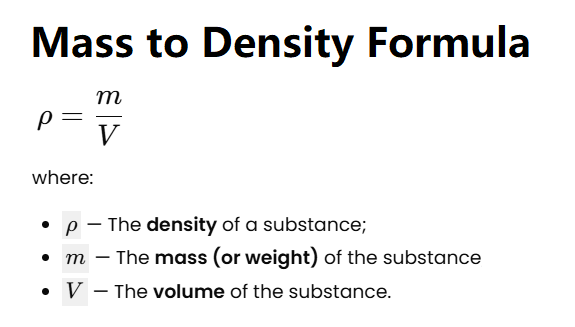 Home
Home
 Back
Back

Density is the mass of a substance per unit volume, typically measured in kg/m³. It describes how compact or concentrated a material is. The density of a substance can be calculated using the formula \(\rho = \frac{m}{V}\), where \(m\) is the mass and \(V\) is the volume. For example, a higher mass in a smaller volume results in a higher density, while a lower mass in a larger volume results in a lower density. Common examples include water (density ~1000 kg/m³) and air (density ~1.225 kg/m³ at sea level).
This calculator allows you to determine the density of any material by inputting its mass and volume, with support for various units.
Density Calculation: The density is calculated using the formula:
\(\rho = \frac{m}{V}\)
Where:
Example Calculation: Let’s calculate the density based on the image example with a mass of 25 kg and a volume of 22 m³:
Use the form above to input your mass and volume values with the desired units, and the calculator will convert them internally to provide the density in multiple units.
The SI unit for density is kilogram per cubic meter (kg/m³). Other convenient units include:
Imperial units for density include:
The calculator displays density in multiple units for convenience, allowing you to choose the unit that best suits your needs.
Density varies depending on the material. Some standard densities at room temperature (20 °C) include:
Use this calculator to compare the density of your material against these standards by inputting its mass and volume.
Mass is the amount of matter in an object, typically measured in kilograms (kg), grams (g), pounds (lb), or ounces (oz). It is a scalar quantity and remains constant regardless of location, unlike weight, which varies with gravity. In this calculator, mass is used as the numerator in the density formula.
Volume is the amount of space an object occupies, typically measured in cubic meters (m³), cubic centimeters (cm³), liters (L), cubic feet (ft³), or cubic inches (in³). It is the denominator in the density formula and can be calculated or measured depending on the object’s shape (e.g., using length × width × height for a rectangular prism).
How do you calculate density from mass and volume?
To calculate density:
What is the density of water?
The density of pure water at 20 °C is approximately 1000 kg/m³. You can verify this by inputting a mass of 1000 kg and a volume of 1 m³ into the calculator.